|
|
| |
| EVENTS |
|
|
> Pakistan Delegation Interacts with Danish MPs and Committees at the Folketing
|
| |
|
Study Visit to UK and Denmark
February 26, 2015
Copenhagen
|
|
| |
Copenhagen, February 25; The Pakistan delegation spent the day interacting with the Danish MPs and Committee Chairs at the Folketing - the Danish Parliament, focusing on the Parliamentary system, Committee system and interacting especially with the Chairs of the Danish Foreign Affairs, Climate, Energy and Building and the Finance Committees, among others. |
|
| |
The interactions at the Danish Parliament included an overview of the 'SkoleValg' introducing democracy to youth in Denmark, challenges and advantages of minority governments, and Denmark's social welfare system.
|
|
| |
Honourable Mr. Nadeem Farooq, the Pakistani-origin Danish MP belonging to the Socialist Liberal Party, briefed the members about the composition of the Danish Parliament. Mr. Farooq explained about the existence of red and blue blocks in the Danish political system. The red blocks include socialistic political parties while the blue block include the liberal-conservatives. He explained that the current Government which is a minority Government consists of three parties under the red block that include Social Democratic Party, Red-Green Alliance and the Social Liberal Party. The opposition parties include the Liberal Party, Conservatives, Liberal Alliance and the Christian Democrats. Moreover, he emphasised that the Government bloc works together with coalition parties on some of the issues in order to stay in power.
|
|
| |
Honourable Ms. Pernille Rosenkrantz-Theil, MP from the Socialist Democrat party and also the Chairperson of the Standing Committee on Labour Affairs, shared that core reason for the Danish Welfare state lies in the high wages for the unskilled workers. High wages also contribute to low corruption in Denmark. She discussed that it is not the Government but the labour market including strong labour unions that decide the wages for each sector of the economy. In response to a question, Ms. Theil said that the multiculturalism is a problem in Denmark compared to that in the UK, for instance, and cited examples where high achiever students from different ethnic backgrounds were not easily absorbed in the Danish job market. She believed that Denmark has a long way to go in absorbing ethnic diversity and embracing multiculturism.
|
|
| |
In a candid interaction with Honourable Mr. Per Stig Moller, MP, Conservative Party and Chairman Foreign Affairs Committee, the Delegation members were briefed on the working and the responsibilities of the Foreign Affairs Committee. Elaborating the working and Rules of Procedures of the Foreign Affairs Committee, Mr. Moller said that Committee regularly calls the Foreign Minister for questioning. Answering to a question on Pakistan's efforts in the War against terrorism, he said that it was all due to the mistrust among the Pakistan and Western world. Honourable Mr. Omer Ayub Khan, MNA and Chairman Standing Committee on Finance while discussing the topic clarified the Pakistani stance and pertinently mentioned that mistakes existed on both sides and that the current Government along with the military establishment does not differentiate between good and bad Taliban and action is being taken against all types of Taliban who pose a threat to the country. Mr. Omar Ayub Khan while discussing the freedom of speech said that while it may remain sacrosanct it should be used with responsibility and not to incite sentiments of the followers of any religion in the world.
|
|
| |
Honourable Mr. Steen Gade, MP, Conservative Party and Chairperson Land, Energy and Building Committee, while briefing the delegation said that by 2020 Denmark will be able to reduce its carbon footprint by 34% and the EU will reach 40 percent reduction in Carbon foot print by 2030.
|
|
| |
Honourable Mr. Jesper Peterson, MP from the Social Democratic Party and Chairman of the Finance Committee, shared with the Pakistan delegation the Budget process in the Danish Parliament and the working of the Finance Committee. He shared that the Budget cycle spans from January to July each year. The Ministry of Finance prepares the Budget Bill. The Committee's role is to scrutinise the Budget Bill by involving six to eight ministries. Change in the budget during the year is referred to the Finance Committee without recourse to the plenary. It was noted during the discussion that Denmark, Pakistan and Bangladesh are the only 3 countries in the World where Parliamentary approval is not sought by the Executive while making changes/additions to the Budgets during the year, once passed by the respective Parliaments. While the revisions are brought before the Finance Committee in Denmark, in Pakistan, the supplementary budget for the previous year is only shared by the Government with the Parliament after the passage of the next year's budget, thus rendering passage of the budget by the Parliament as almost a meaningless exercise Responding to a question about the adoption of Euro as a national currency, Mr. Peterson said that two referendums were held in this regard and the Danish people are hesitant to give up their identity. In 1973, along with Britain and Ireland, Denmark joined the European Economic Community after a public referendum. He further added, after Maastricht Treaty in 1992, the Danish people rejected European integration and therefore rejected Euro as the national currency in a referendum in 2000.
|
|
| |
Mr. Morten Villumsen, Advisor, the Committee Secretariat, Danish Parliament enlightened the members about the Committees, their working and their roles in the Danish Parliament and shared that a total of 26 Standing Committees exist in the Danish Parliament. Each Committee has approximately 29 members. At first, there were 17 members in each Committee and 12 substitute members, however after a reform the number was increased to 29. He further added that the Government parties and the coalition parties have 15 seats in each Committee, while the Opposition has 14 seats respectively. Hence, the Committee membership roughly reflects the distribution of seats in the Parliament. The role of Government in this regard is minimised, as it has no say in deciding the distribution. Mr. Villumsen further said that some of the Committees may ask for a greater participation if a party shows willingness to work on a particular area in relevance to the working of that specific Committees.�The Committee meetings can range from 6-700. Moreover, he said that the Committees work on Bills and proposals for parliamentary resolution after first reading. After the first reading in the Chamber, most Bills and proposals for parliamentary resolution are referred to one of the Standing Committees. When dealing with a Bill or a proposal for parliamentary resolution, the Committee puts a number of questions to the relevant Minister responsible. The Committee may ask the Minister to respond orally, in which case the Minister will be required to attend a consultation in the committee. Mr. Morten Villumsen also shared that some of the Committees may keep their proceedings confidential. However the consultations are open to the public.
|
|
| |
In a frank discussion on freedom of speech with Ms. Suzanne Moll, Press Officer KVINFO, the delegation discussed the need for responsibility in exercising freedom of expression. She believed that when the caricatures appeared in the media, the Danish Prime Minister should have met the Ambassadors of the Muslim countries. Ms. Moll agreed that unlike the outside perception, the thinking classes in Denmark have learnt a great deal from the infamous caricature controversy. She shared that a greater understanding of cultural sensitivities of immigrants is required in Denmark. She also remarked that the controversy reflects more of a social cohesion than a religious issue. Discussing the media Parliament relationship, Ms. Moll said that Denmark is probably the only country in the world where a Press Council has been set up by legislation.
The Pakistan delegation was hosted at a dinner reception by H.E. Mr. Masroor Junejo, Pakistan's Ambassador to Denmark. He appreciated the initiative by PILDAT and thanked the Danish support for the Study Visit.
The Pakistan Delegation on the Study Visit to Copenhagen includes Honourable Syed Naveed Qamar, MNA (NA-222, Hyderabad, Sindh, PPPP), Chairman National Assembly Standing Committee on Railways, Honourable Mr. Omar Ayub Khan, MNA (NA-19, Haripur, KP, PML-N), Chairman National Assembly Standing Committee on Finance, Revenue, Mr. Aqeel Ahmed Yousafzai, Youth Prime Minister, Mr. Muhammad Shahzar lahi, Youth Leader of Opposition, Mr. Sohaib Saeed, Chairperson Youth Parliament Committee on Economic and Finance Affairs, Mr. Ali Shan Khan, Youth Shadow Minister for Foreign Affairs, Syeda Mizghan Mehboob Kirmani, Chairperson Youth Parliament Standing Committee on Education & Youth Affairs and Ms. Rahy Farooq, Member Youth Parliament Standing Committee on Education & Youth Affairs.
The Study Visit to Denmark is funded by DANIDA, the Royal Danish Embassy, Islamabad and has been organized by the DFC in Copenhagen.
|
|
| |
|
|
| |
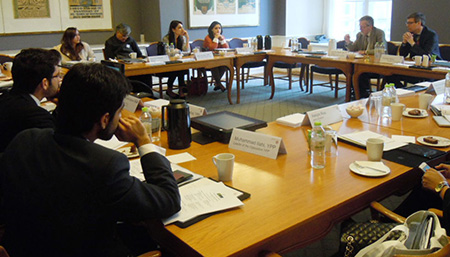
|
|
| |
|
|
| |
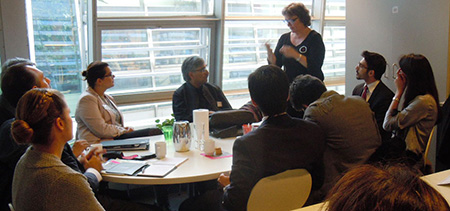
|
|
| |
|
|
| |
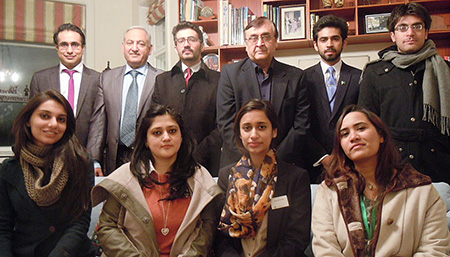
|
|
| |
|
|
| |
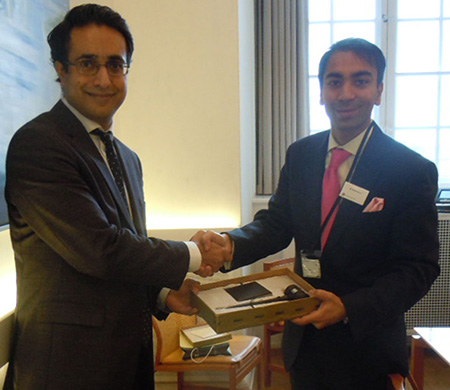
|
|
| |
|
|
| |
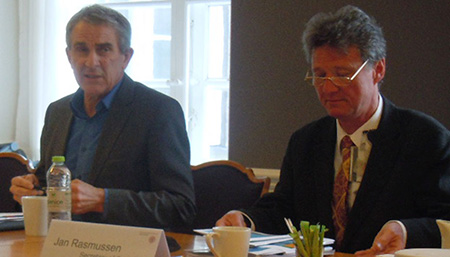
|
|
|
|
|
|
|
|
|